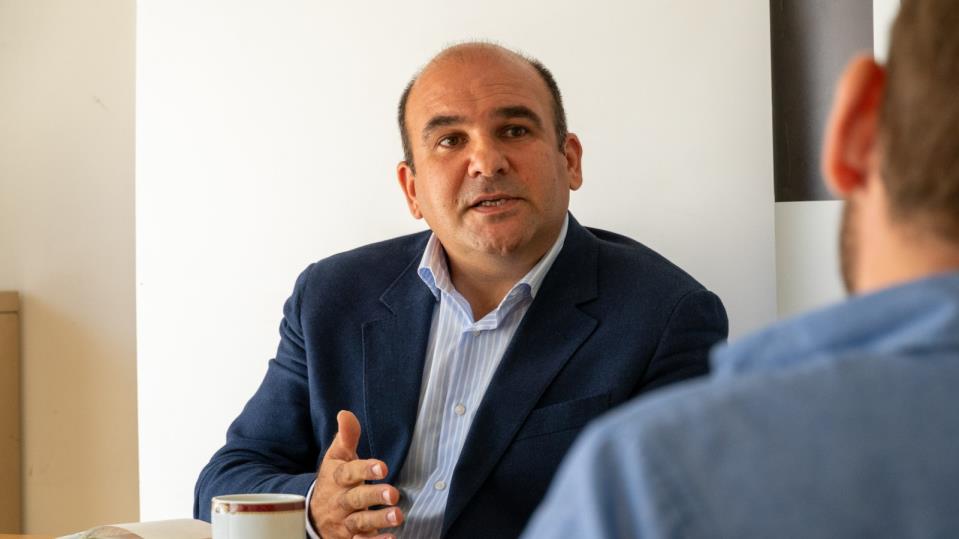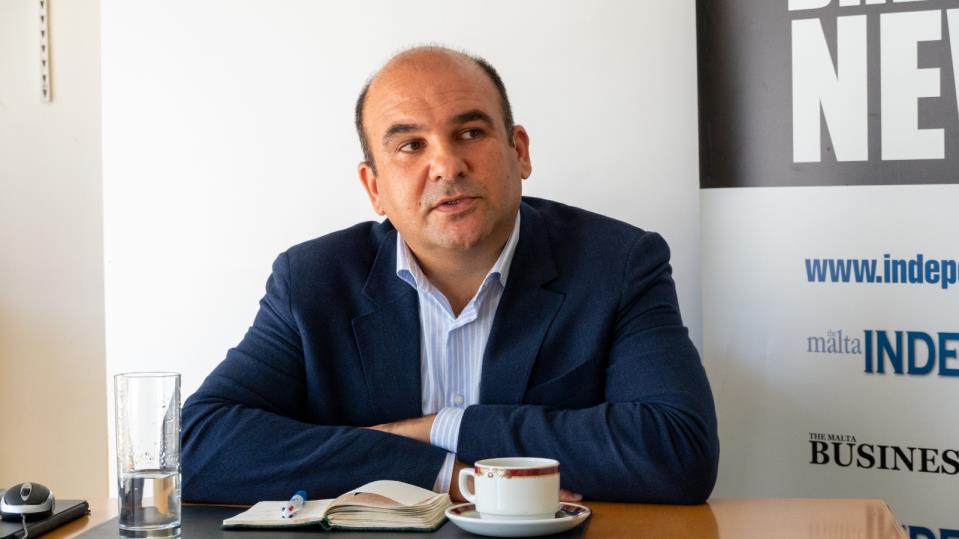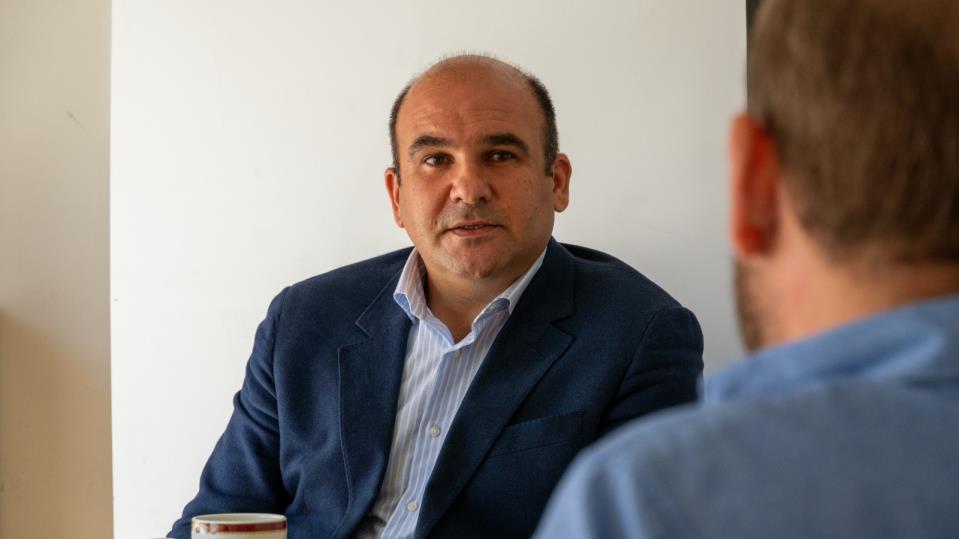The Maltese should vote for a change in government and elect the PN because the Nationalist Party is far more ambitious and can offer better prospects for Malta, according to Peter Agius, the PN’s chief spokesperson.
He argues that contrary to what some people think, the government is not doing well economically, and Robert Abela’s continuity is pushing the country down a “dangerous” path.
In an interview with The Malta Independent’s Editor-in-Chief Neil Camilleri, Agius discusses the PN’s recently unveiled proposals, the Malta-Gozo tunnel, precarious work and the environment, among other subjects.
On the Gozo tunnel, he explains why the party is pledging to hold a referendum among Gozitans, and not the entire population.
He also explains how the PN will tackle the issue of precarious jobs, ensuring that incidents like the one in Mellieħa this week will not repeat themselves.

The PN recently announced a proposal on ODZ development, but there was some confusion. Was the proposal rushed through? What are you proposing exactly?
We are coming up with proposals after consulting with experts, but we need to explain them well.
What we are proposing is that only mega projects, like the one proposed at Żonqor, would require parliamentary scrutiny. There, the government has given away a piece of virgin land on which this ‘educational’ institution wants to build a seven-storey, 700-bedroom dormitory in an area the size of six football pitches.
We do not want to take applications before Parliament for, say, a tool shed in a field, or a small extension to a dwelling in ODZ. These are already regulated by existing planning policy.
We are also pledging to draw up a new rural policy that would go into more detail about what kind of development should be allowed on ODZ.
Parliament would only be roped in cases like that of Sadeen, where the government gifts a private company with a piece of virgin public land. This includes projects on land and at sea because the government is also proposing land reclamation as part of the Marsascala marina project.
Since you mentioned it, where does the PN stand on land reclamation? It’s being mentioned as part of the Gozo tunnel project …
Our position is always guided by the public interest. We do not have a black line where we say that reclamation is absolutely out of the question, but we will definitely not accept a development where there is no evident public interest, where no environmental impact studies have been carried out, and where no consultation has taken place. This is what has happened in Marsascala.
On the Gozo tunnel, our position was clear: the necessary studies should be carried out and then the people will decide.
The same goes for our ODZ proposal; we are not saying that there should be no form of development. Projects will be allowed if they are in the public interest, such as schools and hospitals.
On the subject of the Gozo tunnel, who will decide, exactly? A few weeks back the party said a referendum held among Gozitans.
Our proposal says that there will be a study that involves all affected communities. The tunnel will be there primarily to increase accessibility for Gozitans, but it will start from Malta, so the affected Maltese localities will also be involved, at the least at impact assessment stage.
We are saying that we would hold a referendum among Gozitans because they will be the most affected and they have to evaluate the possible change to the island’s character. They have to see what kind of tunnel is best suited for their needs.
… but one can say that Gozo is ‘tagħna lkoll’, so shouldn’t we all have a say?
Without a doubt. But it is important to understand that Gozitans live on an island that is connected to another already isolated island. They have a double obstacle. Accessibility for Gozitans is fundamental.
But we’re not stopping there. We were the first to propose an air link between the islands, an investment in newer passenger and cargo ships and an extension to the Mġarr harbour, which has already reached capacity.

Some of the PN’s proposals are like the ones being made by government, including on more green spaces.
The government’s idea of public spaces is more tarmac, concrete, plastic and steel.
…. to be fair, it has announced several green projects. The government is also investing in new waste treatment plants, but the PN always seems to criticise. Don’t you think that the time has come for us to do away with this mentality?
I agree with you, we should move away from this mentality. For example, the proposal to develop a garden in the area of the St Sylvester chapel in Mosta is a good initiative. Initially I was shocked because the first thought that came to mind was that someone would chop down most of the trees there, which is something this government is famous for. We are ready to acknowledge the good, but we want to see a more authentic attitude, one that makes public spaces greener.
The government is often criticised over its road-widening mentality. How will a PN government differ?
I think that our policy on the environment can be described in one word – ambition.
The current government has reduced its emission targets and is buying emission credits from Bulgaria to make up for the lack of effort locally. It has thrown in the towel. We have to be more ambitious, and we are leading in this ambition.
It beggars belief to see that there are only 200 charging points for our 4,000 electric vehicles, when there should be three times as much. How can we encourage people to buy electric cars when we have far fewer charging points than we need, and when they do not see a genuine effort by the government? This government always sets minimal standards, and then fails to reach them.
The PN has pledged to buy Ħondoq ir-Rummien and give it back to the public. It is promising the same with Żonqor. But are these pledges realistic? Are they affordable?
Yes, they are, and all our proposals are costed by experts. But we must also keep in mind that, while the financing part is important, this is not everything. We also believe in improving the quality of life of our people. Our life is not all about work … it’s also about recreation, family time, the environment. We are not making frivolous or bombastic pledges. Our proposals are relevant to the communities they affect.
Let’s talk about this week’s incident involving a migrant worker who was left for dead by his employer. Over the years we have heard a lot about eradicating precarious work, but this phenomenon still exists. How will a PN government stop this?
This is a fundamental question. The PN is guided by the successes of its past. While we acknowledge that there were times where the PN might have been more compassionate in the decisions it took, we cannot forget that most of the investment and jobs we have today came because of targeted policies by past PN governments.
Our vision has always been on quality jobs and high value products and services. This is how we fight precarious work, by increasing value. We are talking about creating the jobs of the future, such as in the green economy. We must create many more jobs in the digital economy.
This is one way of tackling precarious work, by ensuring that jobs that are precarious now will not be precarious next year.
This week’s incident has angered us. Some might say that this is not the country they want to live in. While I believe that this was an isolated incident that does not reflect on the sector as a whole, this phenomenon exists.
I worry not only about these illegal jobs, the ones that are invisible, but also about the legal ones promoted by government. The government often gives out contracts to private companies, whose employees end up working alongside public workers, doing the same job, but earning much less. This happens predominantly in Gozo. In some cases, a government employee might earn €500 or more for doing the same job. The concept of equal pay for equal work is being undermined every day and the government is promoting this.
This is how we would fight precarious work – by creating quality jobs and ensuring the concept of equal pay for equal work.
Let’s talk surveys. Polls are showing that the PN is gaining ground, but when it comes to the leaders, Robert Abela is getting stronger. How do you analyse this?
Bernard Grech has only been leader for a year, and the party had just gone through a difficult process. He did not find everything laid out for him, like Robert Abela did, after having Michelle Muscat campaign for him.
I believe that the real comparison between Bernard Grech and Robert Abela should be made in a direct confrontation.
The PM is always playing home. Wherever he goes, PBS will follow with a live broadcast. They do not do the same with us. PN events are reported after the foreign news.
The time has come for this direct confrontation to happen. Bernard Grech has again invited the PM to a debate, but Abela keeps avoiding this. I am convinced that people are taking in what is happening in the country, and support for the PN is growing, maybe not by as much as we’d like to see, but it is growing, nonetheless.

But don’t you think that the PN’s internal struggles are to blame as well? Incidents such as the ‘Team Delia’ show on the Granaries give the impression that the party has not reached full unity. Should a former leader remain in the party?
I will quote Delia when he said, ‘I will not go into pointless arguments about T-shirts. My ambition, everyone’s ambition, is that the next government will be a Nationalist one.’
Your question is justified, because sometimes small incidents happen that when seen from the outside might give the impression of disunity.
Exactly. The opposing party media will always say that there is division, unrest. What would the PN media say if Muscat was still part of the Labour Party?
Since you’re making that comparison, Joseph Muscat is someone who was disgraced, someone who was voted as the most corrupt person of the year. Adrian Delia has given a great contribution to the party and is still doing so. There is no comparison.
The PN has many different protagonists, and this is our strength. We have a lot of motivated people in the party. There is an ongoing process of renewal. Handling personalities is not easy, but everyone has their own value. Our mission is to give the electorate a better choice.
The PN is portraying itself as an alternative government. But the government has done well economically, despite the pandemic, and many of Labour’s sins were carried out under Muscat, not Abela. By and large, people are living comfortably. Why should they vote for a change in government?
I would like to contest your assertion that the government is doing well economically. It is clear that the Maltese are working less and earning less. The government deficit is not all coming from the pandemic. We calculate that the country has a debt of around €16,000 per person, including our children. Some of it is coming from contracts like the ones given to Electrogas and Vitals, some from all the direct orders handed out. The economic situation is not as good as Robert Abela would have us believe.
The IMF and several credit rating agencies are warning us that we are heading down a dangerous path, particularly with the FATF grey listing that Abela brought upon us through his continuity of Joseph Muscat.
Abela is not new, he is continuing on his predecessor. Had he denounced Joseph Muscat, Konrad Mizzi and Keith Schembri, had he seen that all investigations had taken place, Malta could have avoided the grey listing, which is torture for the financial services sector.
We cannot say that the government has a good economic record. To the contrary, its economic record is shameful. This is what we should judge the government on – what are Malta’s prospects for the coming year?
This is why I am proud to form part of the PN, because we have ambitions for better prospects for the country. We have the credibility, the expertise, the talent and the ambition to be that alternative.
This is how the PN should be judged, by comparing what Robert Abela has delivered so far to what we would bring to the table. Abela who refuses to denounce Muscat.
We will build on the good there is. Those who are earning money will keep doing so and will earn more, but we will also be addressing all the wrongs.
This country has been successful thanks to the wise decisions taken by PN administrations. If we are not cautious now, we risk losing it all.